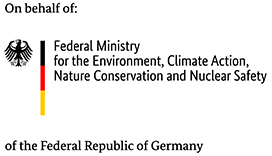Adaptation to Climate Change
Adaptation to climate change is a topic of increasing global importance as many of the negative impacts of climate change on nature and human society are now unavoidable. Extreme weather events such as flooding, hurricanes or heatwaves are on the rise globally. In the funding area "Adapting to the Impacts of Climate Change", the IKI is supporting particularly vulnerable countries and regions in increasing their capacity to adapt to the effects of climate change. The support focuses on ecosystem-based adaptation (EbA), as part of larger-scale adaptation planning, ecosystem-based measures combine climate change impact adjustment and biodiversity conservation, and such solutions are often less expensive than those provided by technological approaches. IKI also supports instruments for the risk management of climate-related extreme events, such as innovative insurance solutions, as well as the development and implementation of national adaptation strategies.
Know MoreProjects

Climate-SDGs Integration Project: Supporting the Implementation of the Paris Agreement and the 2030 Agenda Through Ecosystem-Based Adaptation Completed
Project Lead: Alexander MuellerThe project supported the implementation of ecosystem-based adaptation (EbA) in Guatemala and India to synergistically achieve Nationally Determined Contributions (NDCs) and Sustainable Development Go...
Read More →

ICT-Based Adaptation to Climate Change in Cities Completed
Project Lead: Michael SchwartzkopffIn order to enable cities to adapt to climate change and climate-related weather extremes, urban planners and regional decision-makers need a local database for climate-resilient urban development. Th...
Read More →

Institutionalization of CSO Engagement in the Adaptation Fund Completed
Project Lead: Lutz WeischerThe Adaptation Fund (AF) is an important instrument that assists especially vulnerable population groups in coping with the adverse effects of climate change. The project aimed to strengthen the inter...
Read More →

Mainstreaming EbA - Strengthening Ecosystem based Adaptation in Decision Making Processes Completed
Project Lead: Andrea BenderEcosystem-based Adaptation (EbA) to the impacts of climate change and the integration of climate risks are increasingly forming a central and integral part of planning and implementation processes at ...
Read More →

Mobilizing Community Support for Adoption of Low Carbon Mobility Plans for Cities in Maharashtra Completed
Project Lead: Tanzeel AllapurA shift to low carbon mobility in Indian cities is urgently needed to tackle air pollution, greenhouse gas emissions and social inequality in the mobility sector. This project mobilizes support for lo...
Read More →

Morgenstadt Global Smart Cities Initiative: Global Approach- Local Solutions Completed
Smart and sustainable urban development is one of the main solutions for climate change adaptation and the efficient use of resources. However, the sectoral approaches to sustainable urban development...
Read More →

Sustainable Energies Entrepreneurship and Development in Rural Kashmir (SEED Himalaya) Completed
Project Lead: Daphne GondhalekarThe livelihood of the rural population in Jammu and Kashmir is particularly threatened by climate change due to the negative impact of varied rainfall patterns and more frequent extreme weather events...
Read More →

Transformational Project Pipelines for NDC Implementation Completed
To date, many countries have lacked a clear pathway to financing and implementing their NDCs. To rectify this situation, the project is building capacity in partner countries to ensure they have the r...
Read More →
Transformative Climate Action Using Participatory Data Driven Decision Making Platforms (T-CAP) Completed
Project Lead: Dr Himanshu ShekharWhile digital means are increasingly used to assist in managing cities, an untapped potential lies in using these means to facilitate participatory local-level policymaking and implementation to catal...
Read More →
Copyright © 2025 All rights reserved




